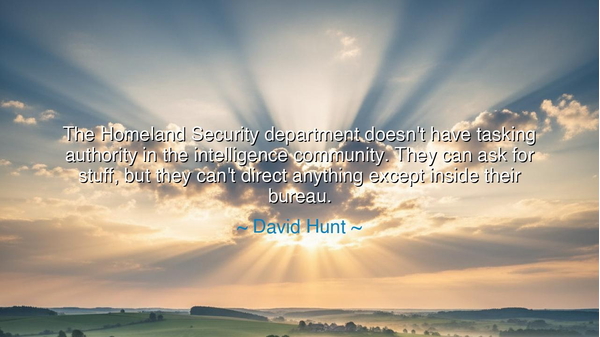
The Homeland Security department doesn't have tasking authority
The Homeland Security department doesn't have tasking authority in the intelligence community. They can ask for stuff, but they can't direct anything except inside their bureau.






“The Homeland Security department doesn’t have tasking authority in the intelligence community. They can ask for stuff, but they can’t direct anything except inside their bureau.” — David Hunt
In this statement, David Hunt, a man seasoned in the shadowed arts of strategy and security, speaks not merely of bureaucracy, but of the balance of power — the eternal dance between command and cooperation, authority and restraint. His words, though shaped by the modern structures of intelligence and governance, echo truths as old as the civilizations that first sought to guard themselves from unseen threats. In essence, he reminds us that power without command is a hollow thing, and yet, that even without command, influence and unity can wield great strength when properly understood.
The origin of this quote lies in the aftermath of the great upheaval that followed the attacks of September 11, 2001. In response to that tragedy, the Department of Homeland Security (DHS) was born — a vast organization forged to protect the nation from future harm. Yet even in its creation, there was a lesson written into its design: though mighty in scope, DHS was not the master of the nation’s intelligence services. It could request, but not command; it could coordinate, but not control. Hunt, himself a man of military and intelligence background, understood this distinction not as a flaw, but as a necessity — for absolute power, even in defense, can blind as easily as it can protect.
Throughout history, empires and nations have wrestled with this truth. Consider Ancient Rome, where the Senate and the generals often clashed for dominance. When Caesar crossed the Rubicon, seizing both political and military power, the Republic fell, and freedom waned. The Romans learned too late that unchecked authority destroys the balance that safeguards justice. In contrast, the modern intelligence world — fragmented though it may seem — was built to ensure that no single hand could hold both the sword and the secret, for such unity of power invites the tyranny of certainty, and certainty, as every sage knows, is the enemy of truth.
Hunt’s words also reveal a deeper wisdom: that collaboration is not weakness. To “ask” is not to be lesser than one who commands; it is to recognize the strength of interdependence. The Department of Homeland Security, though lacking “tasking authority,” is part of a grander design — one that requires humility and harmony. Like the spokes of a wheel, each agency must turn together to move the whole. The intelligence community — with its many branches and voices — survives not by obedience to one, but by the communication among many. In this, Hunt’s observation becomes a meditation on leadership itself: that sometimes, the most powerful leader is not the one who commands, but the one who unites.
There is a lesson here for every seeker of wisdom and every steward of responsibility. In life, as in governance, there are times when we wish for control — to dictate, to direct, to bend events to our will. But wisdom teaches restraint. True mastery lies not in domination, but in influence grounded in respect. The wise ruler, the wise parent, the wise teacher — all understand that asking with clarity and listening with patience often achieves more than commanding with force. The structure of Homeland Security reflects this truth: that a system built upon cooperation may be slower, but it is stronger, for its foundation is trust, not fear.
So too in our personal lives must we learn this balance. When you cannot command, collaborate. When you cannot control, communicate. When you are not the one with authority, become the one with understanding. Power is fleeting; wisdom endures. The networks that hold families, communities, and nations together depend not upon hierarchy, but upon mutual purpose. The homeland of any people — whether literal or spiritual — is made secure not by command alone, but by shared vigilance and shared values.
Thus, let us remember the lesson behind David Hunt’s reflection: authority is not the same as purpose, and asking is not the same as weakness. To build anything lasting — whether an organization, a family, or a nation — we must honor both independence and interdependence. The mighty oak stands tall not because its branches command the roots, but because each part of it knows its place, working in harmony with the rest. So too must we act — not as masters over one another, but as guardians together of what we hold sacred.
And so, in the end, Hunt’s words stand as a quiet warning and a powerful teaching. Let every generation remember: coordination is the armor of wisdom, and humility is the weapon of strength. For even when we lack authority, we possess something greater — the ability to unite, to ask, to influence, and to build a collective force mightier than any command: the strength of a shared will, bound by trust and guided by understanding.






AAdministratorAdministrator
Welcome, honored guests. Please leave a comment, we will respond soon